When I left the military, I immediately pursued a career in teaching. When I first began my teaching journey, I did not have a mentor teacher, and even before attending pre-service training, I started working at an alternative charter school for “at-risk” youth. I loved every minute of it and even though I didn’t have a mentor teacher, it sure felt like I did. I formed a very strong bond with one of the teachers at the school; we were inseparable. It was love at “first teach.” We even did action research on the team teaching. Our proposal to share one classroom and to teach grades 9th – 12th together was actually approved. I must admit, the first five years of my teaching experience were some of the best years because of this special relationship. However, this type of experience is quite rare. We know that even the best prepared teachers will struggle during those first crucial years of teaching if not supported in the school environment, making mentoring and induction critically important to the retention of new teachers.
I have been with my current school district for the past ten years. This is my 3rd year as a mentor teacher and year 3 for the district’s mentoring program. I have anecdotal, qualitative testimonies from beginning teachers who shared with me that they would have left my school district if it wasn’t for the mentoring program. This is one of the main reasons why I became a mentor teacher. I see the value in forming strong, supportive partnerships with first year teachers. Just like my first few years of teaching, I want my beginning teachers to have someone that they can confide in and trust. I want to help create a positive and memorable teaching journey for them. Ultimately, I would like my new teachers to find their voice, to become a teacher leader, and as we like to say in my mentoring circle–proceed until apprehended! Through the mentoring program, my school district is trying to foster a culture of learning, creativity, and support, encouraging all educators to grow professionally and personally in ways that benefit the organization as a whole. Mentoring programs, all over the country, either formal or informal, aim to meet these objectives, but the question then becomes is sufficient support given to schools to sustain and to cultivate an effective mentoring program? Are we given adequate funding and resources from the state to grow our own? Many of us would agree that the answer is absolutely not.
In response to increasing concerns relating to the shortage of highly qualified teachers and high turnover rates of educators in Arizona schools and districts, and the challenges this lack of stability creates, the Arizona Department of Education formed the Educator Retention and Recruitment Task force. In their January 2015 report, they noted that, “new teachers need ongoing, job-embedded, applicable professional development and mentoring support since lack of assistance and supportive teaching conditions are two chief reasons why teachers leave schools or the profession entirely…Due to drastic budget cuts in the last few years, many support structures for new teachers have been reduced or eliminated. There is currently no state support for this critical component of teacher retention. Structured mentoring and induction programs are two key support systems for new teachers as they enter the teaching field” (p. 4). One of the recommendations in the report is for policymakers to “support and fund evidence-based structured induction programs for new teachers and effective professional development for all teachers and leaders” (p. 10). How do we get there? Based on all the current research that shows the positive impact of induction programs for beginning teachers, why are we not getting more support?
While policy makers scramble to figure this out, we are still left with many school districts struggling to retain teachers and to provide the necessary support structure for beginning teachers. However, with the wonderful support of the New Teacher Center and funding through the Arizona K-12 Center, many school districts, like my own, are able to develop a sustainable mentoring program. One promising practice that’s also gaining traction is school districts growing their own beginning teachers by recruiting future educators as early as high school. Every year, in my classroom, there are at least 1 to 2 students with proud smiles on their faces who want to join this great profession. In a recent article in Educational Leadership, Brown writes, “teenagers crave impact. They are starved for role models. They are often bored in high school. Opportunities to test-drive teaching in high school can satisfy all of these needs… Clear mechanisms for recruiting and supporting future practitioners are a hallmark of successful professions. Emerging efforts to start early, coordinate stakeholders, broaden the tent for recruitment, and leverage grow-your-own efforts show enormous promise. Visionary district leadership will play a leading role in realizing this potential” (para 6). The article also expressed concerns of how, at times, as educators, we inadvertently send a barrage of discouragement to the few youth who show an interest in pursuing a teaching career. Many of us actively steer young people away from our profession unknowingly because of our built up frustration for things occurring within the profession. If we are going to grow our own, we must become ambassadors for our profession; there are challenges, but we must communicate that those who have a desire to join our profession will be part of something special, impactful and significant.
Whether we grow our own or continue to push our lawmakers to fund induction programs, one thing is clear: “Induction is an education reform whose time has come. Over the past two decades, there has been a large increase in the number of states, districts, and schools offering support, guidance, and orientation programs. Importantly, the data also indicate that induction can help retain teachers and improve their instruction. The data also show that the kinds and amounts of support vary. And some research suggests that content, intensity, and duration are important: The effect depends on how much induction one gets and for how long” (Ingersoll, 2012).
POST UPDATE: 9/7/16
I am currently attending the Arizona New Teacher Induction Network Meeting in Tucson, Arizona, which really makes this blog quite timely. This Network meeting has been such a game changer! Dr. Richard Ingersoll is with us. He shared some startling data based on his research: The Growing Need for Beginning Teacher Induction. I have included some of his data below. Dr. Ingersoll is a renowned author, educator and researcher. Dr. Ingersoll’s research is nationally recognized and was cited by former President Clinton in a number of speeches announcing his teacher recruitment and training initiatives.






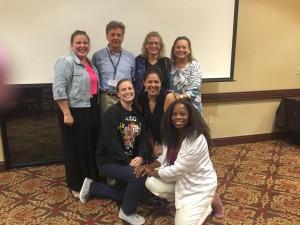
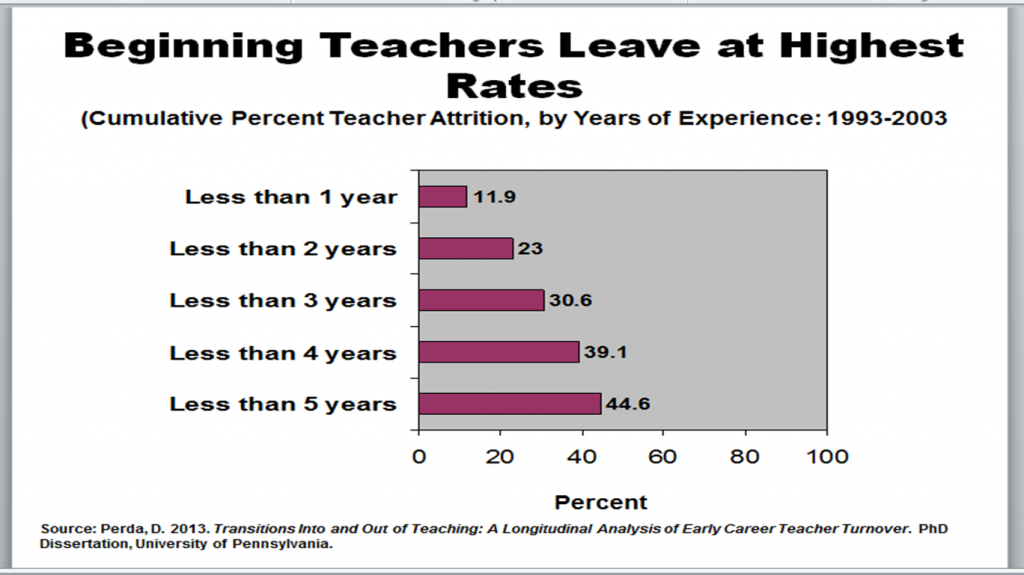

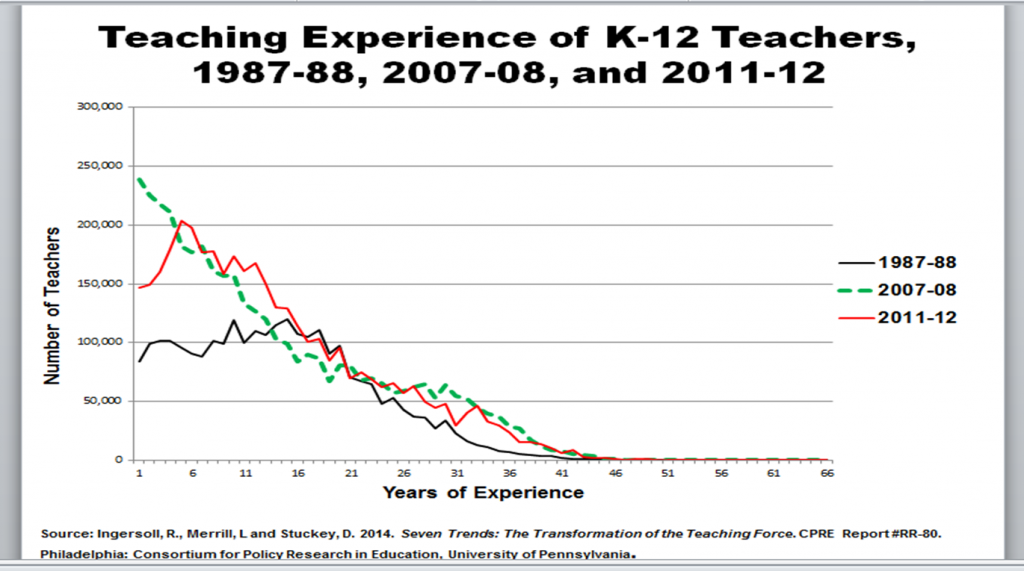
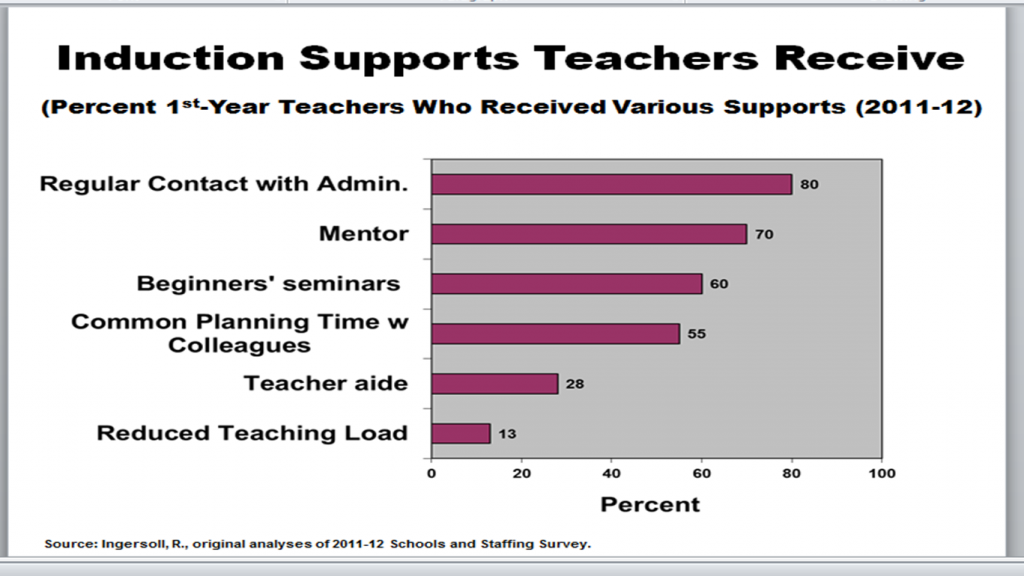
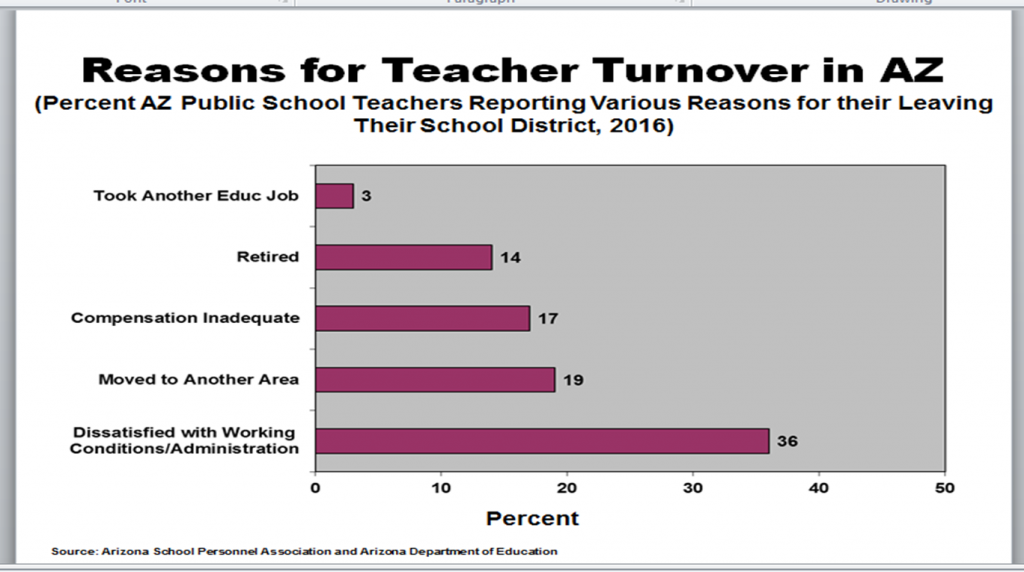




Comments 6
This is an extremely important topic and a very well written argument in favor for programs that highly impact teacher morale, effectiveness, and community. I especially appreciate that you mention the students who already want to become teachers! It is so important that these kiddos receive positive messages about the profession. Despite the battles we face, there is so much good in what we do and in what we receive– too often we get hung up on the same excuses. These slides show that dissatisfied teachers don’t just leave because of pay. When I look at that data about working conditions and think about your claim regarding mentors, I can’t help but think we could all benefit from a mentor teacher who reminds us of our strength and inspires us to continue refining.
Thanks for the excellent post, Treva.
“If we are going to grow our own, we must become ambassadors for our profession.” This is such a true statement. This blog is so important for current educators and policy makers. The facts are there, the data is in, we know how to solve this growing education crisis. Thank you for making your practice public and working so hard to improve our professional practices.
I really enjoyed this fact-filled blog post supporting new teacher induction. In my last district, I worked as an induction coach (after school mentor) for early career special education teachers for four years. Each year, the program was cut and cut and cut. There was little left by the time I left the district, and I still feel sad about it. At a time when education funding is scarce, it seems that some districts are decreasing mentoring instead of increasing (or sustaining) these programs. It’s great to hear your stories of success!
Treva you are – and continue to be – such a positive narrative of all we “do” as educators. Teaching is so multi-layered…let’s start at the beginning! As Dr. Ingersoll shared , we want the Cadillac of Induction Programs in place in all schools! Remembering that everything WE do has a direct impact on our kiddos. When our teachers succeed, our students succeed! Thank you for all you are!
Yaaaas! There is such a gap between where university teacher preparation leaves off and mentoring picks up in school districts. It’s unrealistic to expect universities to prepare the kinds of highly trained experts that our different school districts/communities need… and it’s equally unrealistic for school districts to hire new teachers thinking that they have learned everything they need to learn from universities to be ready to be alone with the human beings that are our students. The sweet-spot is in programs and partnerships that help us more efficiently, and humanely, pass the torch from university to the first few years of a teacher’s career. Thank you for bringing this issue to the forefront of discussion!
Great points about the value of mentoring. It’s also very inspiring for the mentor as well as the mentee. To sit down, digest your growth and success in the profession, and determine the key takeaways to share with a mentee reminds the mentor of why he/she stayed in the profession.